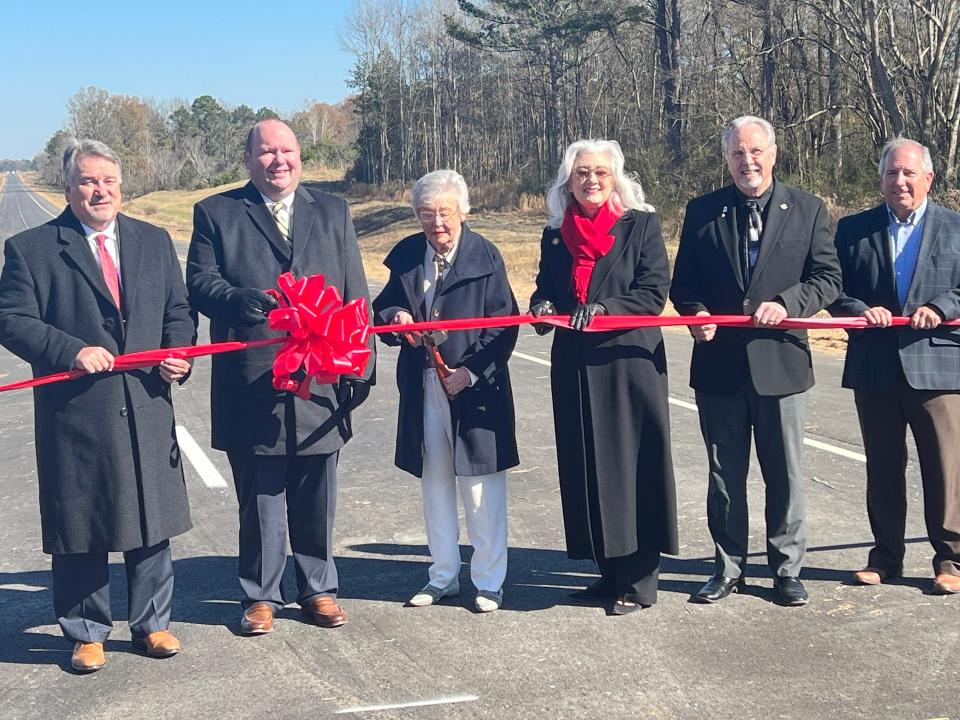Dream becomes reality: U.S. Highway 411 now four lanes between Etowah, Cherokee counties
After more than a half-century, it’s no longer a dream: U.S. Highway 411 is now four lanes all the way from Leesburg in Cherokee County to Gadsden in Etowah County.
Gov. Kay Ivey joined local legislators, other elected officials and dignitaries, Alabama Department of Transportation officials and the media Wednesday at a ceremonial ribbon-cutting for the 5 miles of roadway, from Turkeytown in Etowah County to Cherokee County Road 20, which made the dream a reality.

Curtis Vincent, ALDOT’s North Division engineer, said he hoped traffic could be shifted to the highway sometime Thursday, weather permitting. However, he said there still could be delays for motorists for a while as crews continue to work on tie-ins and crossovers from side streets, and on each end of the new stretch.
It will link with roughly 8 miles of roadway, from Princeton Avenue in Gadsden to Appalachian Highway, that opened in 2015, giving traffic from Cherokee County unfettered access to Interstates 59 and 759 in Gadsden. (It had been one of 16 Alabama counties without a direct path to an interstate.)
Ground was broken on the $34 million project (Vulcan Materials was the contractor) in 2020. It was one of the first two projects announced for Rebuild Alabama, an initiative passed by the Legislature in 2019 that raised the state tax on gasoline and diesel fuel to help fund infrastructure improvements.
Ivey, who also attended the groundbreaking, called it “a very exciting milestone” for the region, that has “paved the road between Leesburg and Gadsden with progress and opportunity.”
She added, “For more than 50 years, U.S. 411 has been in desperate need of improvements, The continued growth of this area between industry and families relocating here has made traffic an aggravating issue for residents.”
Ivey said the price tag is the reason it’s taken this long to become a reality, adding, “Before we passed Rebuild Alabama, we simply had no way to fund it,” she said.
That initiative has grown to include major road and bridge projects in each of Alabama’s 67 counties, that Ivey said has made those things “safer and more accessible for residents and businesses alike.”
“At the time (the Rebuild Alabama Act was passed), it was estimated that we’d be asking Alabama drivers to invest probably $1 more per week,” said Sen. Andrew Jones, R-Centre. “Looking out at this road, I think we’ve gotten our money’s worth.”
Jones said he was excited about the potential business and economic prospects from the project, which he called “the crown jewel” of Rebuild Alabama. He recalled hearing “naysayers talk about how we wouldn’t see anything here locally, that all the money would go to the big population centers, and we wouldn’t see any projects funded.”
More: U.S. 411 improvement is important project for Cherokee County, northern Etowah County
Rep. Ginny Shaver, R-Leesburg, a longtime advocate for the project, reviewed its tortuous history that she said dates to the late 1950s when construction began on Weiss Dam.
She said plans were formulated and rights-of-way purchased in the 1960s and ‘70s, and she has a newspaper clipping from the 1980s when then-Gov. George Wallace announced an actual bid letting.
"It was going to cost a whopping $1.2 million and take a year to complete, weather permitting,” said Shaver, who recalled learning to drive on U.S. 411 when it was a two-lane highway. “Unfortunately, it didn’t happen.”
Neither did it happen, she said, after KTH Leesburg Products, an automotive components plant that opened in 2001, was promised that it would “and you can get your trucks to Honda (in Lincoln) on a four-lane highway” if it located in Cherokee County.
Shaver continued to push for the four-laning as Leesburg’s town clerk and then while working for the City of Gadsden. She recalled collaborating with the late J.R. Countryman, former Gadsden City Council member, in presenting a petition signed by 3,000 people to then-U.S. Sen. Richard Shelby, R-Tuscaloosa.
After the south end of the highway was completed, however, the north end dropped off ALDOT’s 10-year plan. When that happens, Shaver said, “That’s where transportation projects go to die.”
She said she heard constantly from people that they wouldn’t live to see the four-laning finished, “and unfortunately that’s true for so many that worked for it, but didn’t live to see it done.”
Shaver praised Ivey and Rebuild Alabama, which she called “a bold plan,” for getting it done.
“She knows and loves this state, and could see what Alabama needed (in order to) grow,” she said. “We were in a place to be stagnant, and we could not grow without investing in our infrastructure to keep the business and industry we have, and attract (new ones).
“Manufacturers need good roads to be able to get their supplies in and their products out,” she said. “Our farmers need good roads to get their materials in and their crops out. Tourism needs good roads so people can come to Alabama and enjoy the beauty we have from the mountain lakes region all the way to the coast.”
Ivey cited a recent survey by Insider Monkey, a financial services website, that said Alabama had the third-best road system in the U.S. (The main criteria was roughness of urban and rural roads.)
“In four years, we have gone from being back in the pack in infrastructure to a national leader, and that’s a direct result of our efforts to Rebuild Alabama,” she said. “Going forward we will take the same approach ... and apply it to other challenges.”
According to ALDOT, the southern part of the roadway that opened eight years ago cost more than $58 million to construct, and the overall cost of design, right-of-way acquisition, utility relocations and construction for the entire 13 miles should be about $110 million.
This article originally appeared on The Gadsden Times: Cherokee, Etowah counties now linked by four-lane highway

